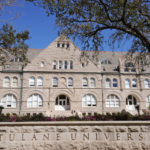How to Write the Oklahoma State University Essays 2025-2026
For Oklahoma State University applicants, the only essays are for Honors College applicants. The first is a short answer and is required for all Honors College applicants. Only students who do not meet the assured criteria for the Honors College must respond to prompts 2 and 3.
The aforementioned criteria are as follows:
“High school grade point average of 3.85 or higher OR
ACT composite score of 27 or higher or SAT Math/EBRW score of 1260 or higher and high school grade point average of 3.75 or higher OR
Holistic review of GPA, Scores (if available), admissions essays & leadership and involvement resume, transcript, and response to two Honors specific essays. If you do not meet the first two criteria, you may complete the supplemental essays below.”
Let’s take a look at these prompts and break down how you should respond to them.
Oklahoma State University Supplemental Essay Prompts
Honors College Applicants
Prompt 1: Aliens land and ask for one thing to represent Earth. What do you give them and why? (50 words)
Prompt 2: Discuss how your previous or current extracurricular involvements (such as jobs, community service, leadership roles, or other after-school responsibilities) and the challenges you have faced in your life have equipped you to be a successful college student. (250-300 words)
Prompt 3: Think of a topic you find interesting but is unrelated to your studies. Recount a specific occasion when you wholeheartedly pursued knowledge for its own sake, without being motivated solely by grades or diplomas. Reflect on the importance and impact of this specific learning experience on your personal growth. (250-300 words)
Prompt 1 (Required)
Aliens land and ask for one thing to represent Earth. What do you give them and why? (50 words)
This is a creative short answer prompt. It’s playful, but it still tells admissions something about your worldview, personality, and priorities. With only 50 words, you’ll need to be concise, original, and thoughtful.
The admissions office wants to see your creativity. Can you think outside the box in a clever or insightful way? What object, idea, or symbol do you believe best represents humanity? Even in just 50 words, you should sound like you. This isn’t about guessing the “right” answer—it’s about choosing something meaningful or quirky and explaining why it matters.
When planning your response, consider the following questions to guide your thinking:
- What do you think defines humanity—art, science, culture, compassion, humor, technology, resilience? Something else entirely?
- If you had to pick a single item, what could capture that definition? (Examples: a musical instrument, a novel, a recipe, a smartphone, a prosthetic limb, a handwritten letter, a laugh track, seeds, a photo album, etc.)
- What’s something personal to you that also says something about a universal shared experience? (e.g., your grandmother’s cookbook represents culture, love, and survival)
- What do you want the admissions team to learn about you from your choice?
Be specific. Don’t just say “a book.” Say The Odyssey, or a well-worn library card, and explain your choice. Ideally, your choice represents humanity while also reflecting you personally. You have only 50 words, so avoid fluff—every word should reveal personality or insight.
Be original. Avoid overused answers like “the Bible,” “the Constitution,” “the Internet,” or “a globe.”
A good response will also show passion, connection, and creativity. Convey enthusiasm for the subject to make your choice stand out. Show how this topic relates to your experiences, future goals, or personality. Choose an unconventional or surprising topic that could capture attention.
To see some ways that this response might take shape, let’s take a look at some hypothetical example students:
- Marcus, jazz musician: Gives the aliens a trumpet. For him, jazz represents improvisation, resilience, and the blending of cultures—uniquely human qualities.
- Amira, aspiring doctor: Gives the aliens a stethoscope. It represents care, healing, and humanity’s drive to protect one another.
- Diego, environmentalist: Gives the aliens a packet of sunflower seeds. It symbolizes growth, sustainability, and the beauty of Earth’s ecosystems.
Here are some good and bad example responses, along with explanations as to why they work and don’t work, respectively.
Good example
“I’d give the aliens a quilt—stitched scraps from different fabrics, vibrant on their own but strongest when woven together. Humanity is patchwork: cultures, languages, and histories interlocking. My grandmother taught me quilting isn’t just craft; it’s community. That’s the Earth I’d want them to know.”
Why this works: Creative, symbolic, personal, visually vivid, and says something deep about humanity in under 50 words.
Bad example
“I would give the aliens a globe because it shows what Earth looks like and represents unity. The globe would help them understand our geography and all the countries. It is the best way to represent humanity because it shows where we all live.”
Why this doesn’t work: Overdone, too literal, doesn’t show anything personal, wastes words.
There are some mistakes you’ll want to avoid making in your response:
- Being too abstract: Saying “love” or “hope” without tying it to a concrete item.
- Using clichés: Globe, Bible, smartphone, “art” without specificity.
- Rambling: With 50 words, long setups or explanations will crowd out any insight.
- Making impersonal choices: Picking something impressive (like “Shakespeare’s works”) without explaining why it matters to you.
Prompt 2 (For students who do not meet the assured criteria of the Honors College)
Discuss how your previous or current extracurricular involvements (such as jobs, community service, leadership roles, or other after-school responsibilities) and the challenges you have faced in your life have equipped you to be a successful college student. (250-300 words)
This is a typical Extracurricular prompt. The goal is to show how your activities and experiences have given you the qualities and tools to succeed in a college environment.
Before you begin writing, you’ll have to decide which extracurricular involvements you’ll want to describe and why. To help you think about this idea, consider the following questions:
- What extracurricular activities or jobs have you been involved in? What roles did you take on?
- Have you faced any significant challenges, either within these activities or in other areas of your life?
- What skills or lessons did you learn from these experiences?
- How have these experiences prepared you for the demands of college life?
- Can you connect these experiences to your academic or career goals?
Provide concrete examples of your extracurriculars and challenges, focusing on your roles and the skills you developed. Highlight how you grew from these experiences and how they shaped your character and work ethic. Be sure to link your experiences to the skills or traits needed to succeed in college, such as independence, time management, or resilience. Discuss both your extracurricular involvement and the challenges you’ve faced, showing how they complement each other in preparing you for college.
Here are some hypothetical student examples to show you different ways this essay might be tackled:
- Maria, a Debate Team Captain and First-Generation Student: Maria led her high school’s debate team, where she honed her research and public speaking skills. As the oldest of five siblings, she also had to balance her responsibilities at home, which taught her time management and the ability to stay focused under pressure. She plans to use these skills to manage the demands of college coursework while pursuing a degree in political science.
- Jamal, a Part-Time Worker and Volunteer Tutor: Jamal worked 20 hours a week at a local grocery store while maintaining good grades. He also volunteered as a math tutor for middle school students. Balancing work, school, and volunteering taught him the importance of discipline and effective time management, which he believes will help him handle the rigorous schedule of a computer science major.
- Lena, a Varsity Athlete and Community Service Leader: Lena was the captain of her school’s varsity soccer team and organized community clean-up events. She faced the challenge of recovering from a major injury, which tested her resilience and determination. These experiences taught her to set goals, work hard, and overcome setbacks, all of which she plans to apply to her studies in applied exercise science.
Let’s take a look at some good and bad example excerpts to give you an idea of how you should and shouldn’t approach this essay.
Good example
“Working 20 hours a week at a local restaurant while juggling school and extracurriculars taught me invaluable time management skills. I often had to prioritize tasks, like completing homework during breaks or organizing my study schedule around my shifts. Additionally, as the president of the school’s environmental club, I organized weekly recycling drives, which deepened my commitment to sustainability and sharpened my leadership abilities.
Balancing these responsibilities was challenging, but it prepared me for the rigorous demands of college. I’m confident that the discipline and organizational skills I’ve developed will allow me to excel in my coursework and contribute meaningfully to campus initiatives focused on environmental sustainability.”
Why this works: This example provides specific details about the student’s work and leadership roles, clearly linking these experiences to skills like time management and leadership. It also connects these skills to the student’s future goals in college.
Bad example
“I have faced many challenges in my life, such as balancing school with after-school activities. These experiences have taught me resilience and leadership, which will help me be successful in college.”
Why this doesn’t work: This response is too vague and doesn’t provide specific examples of the challenges faced or how they helped the student develop important skills. The connection to college success is also unclear and generic.
There are some common mistakes in this kind of prompt that you’ll want to avoid:
- Overemphasis on challenges without growth: Simply listing challenges without explaining how you grew from them doesn’t show readiness for college.
- Picking the wrong activity: Bad activities include those that you’ve already discussed in-depth in another essay, activities that sound impressive, but you don’t actually feel that passionate about, or activities that you haven’t spent much time on.
- Focusing on too many activities: Don’t try to mention every activity you’ve been involved in; focus on a few key experiences that best demonstrate your growth and preparedness. This is not a resume; this is a chance to highlight specifics.
- Generic connections: Avoid vague statements like “this taught me leadership.” Instead, explain specifically how an experience developed a skill and how you plan to use it in college. Show rather than simply telling.
Prompt 3 (For students who do not meet the assured criteria of the Honors College)
Think of a topic you find interesting but is unrelated to your studies. Recount a specific occasion when you wholeheartedly pursued knowledge for its own sake, without being motivated solely by grades or diplomas. Reflect on the importance and impact of this specific learning experience on your personal growth. (250-300 words)
This prompt asks you to reflect on a time when you were driven to learn something purely out of curiosity or passion, rather than for academic or career benefits. It seeks to understand your intellectual curiosity and passion for learning, as well as how such experiences contribute to your personal growth. These qualities are imperative for students who are pursuing the Honors College.
To help you figure out what occasion would be best for you to write about, think about these brainstorming questions:
- What are your hobbies or interests outside of school?
- Have you ever spent a lot of time learning something just because it fascinated you?
- Was there a particular moment or experience when you became deeply engrossed in this interest?
- How did this pursuit impact you, and what did you learn from the experience?
A good response will be specific—focus your essay on a specific learning experience, providing enough detail to make the story engaging. Show your genuine curiosity and enthusiasm for the topic. Then, reflect on how this experience changed you or contributed to your development. Choosing a unique topic that is truly unrelated to your studies will demonstrate a well-rounded personality and diverse interests.
Here are a couple of hypothetical example students to show you different ways in which this prompt can be approached:
- Nathan, a science enthusiast who took up photography: Nathan is a biology major, but one summer, he became fascinated by photography after borrowing a friend’s camera. He spent hours watching tutorials and experimenting with different techniques, eventually mastering the art of capturing natural landscapes. This experience taught him patience, attention to detail, and a new way of appreciating the world around him.
- Emily, a history buff who learned sign language: Emily is passionate about history, and after meeting a Deaf classmate, she decided to learn American Sign Language (ASL). She attended ASL meetups and practiced regularly—not for any academic reason, but because she was inspired by the beauty of the language and the culture behind it. This experience broadened her understanding of communication and empathy.
Let’s take a look at effective and ineffective examples to see what works and what doesn’t:
Good example
“One evening, while flipping through TV channels, I stumbled upon a documentary about the history of jazz music. Captivated by the complex rhythms and emotional depth, I decided to learn more. I spent the next few months devouring books on jazz, listening to artists like Miles Davis and John Coltrane, and even attempting to play simple tunes on my old keyboard.
My journey into the world of jazz was purely for my own pleasure—there were no grades or accolades at stake. What I gained was a deeper appreciation for the art of improvisation, which has since influenced my approach to problem-solving. Jazz taught me the beauty of spontaneity and creativity, lessons I now try to apply to all areas of my life.”
Why this works: This example is specific, showcasing a clear passion for jazz music. The student reflects on the personal impact of this learning experience, connecting it to a broader skill—improvisation—that has enhanced their personal growth.
Bad example
“I love learning about new things, and one time, I decided to learn about art history just because it seemed interesting. I read a lot of books and looked at paintings online. This experience taught me that learning is fun, and that it’s important to pursue knowledge for its own sake.”
Why this doesn’t work: This response is too vague and lacks specific details about the experience. It also fails to provide meaningful reflection on how the learning impacted the student beyond a generic statement about the value of learning.
Here are some common mistakes to avoid making in your response:
- Choosing an academic topic: Don’t pick a topic related to your major or career goals; the prompt specifically asks for something unrelated to your studies.
- Lack of reflection: Merely recounting what you did without reflecting on how it impacted you will weaken your response.
- Being too broad: Avoid discussing a general interest; focus on a specific occasion when you pursued this interest deeply.
Where to Get Your Oklahoma State University Essays Edited For Free
Do you want free, nearly instantaneous feedback on your Oklahoma State University essays? After rereading your essays countless times, it can be difficult to evaluate your writing objectively. So meet Sage, our AI tutor and advisor, who will rate your essay, give you suggestions for improvement, and summarize what admissions officers would take away from your writing. Sage can improve your chances of acceptance to your dream school by helping you show what you have to offer beyond the numbers!


